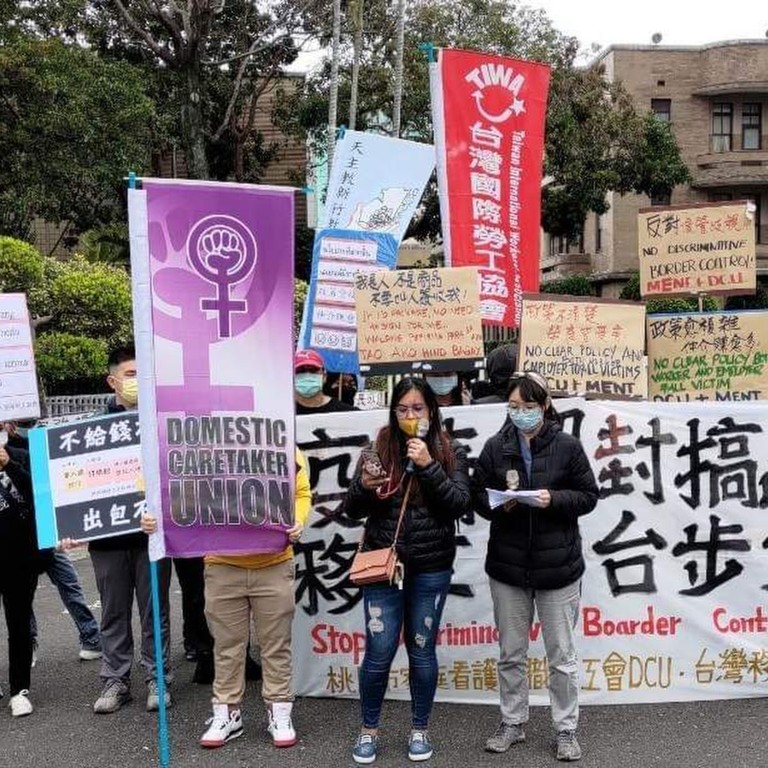
Southeast Asian migrant workers protest Taiwan’s ‘discrimination’ in border controls
- Holidaying migrant workers, mainly from the Philippines and Indonesia, decry extra steps to return to their jobs in Taiwan
- Dozens of union and advocacy group members have protested after lodging complaints to labour officials
A union of mainly Filipino and Indonesian workers is demanding that Taiwan, stretched thin for foreign labour, scrap border-crossing paperwork that targets Southeast Asian migrants returning to their jobs from trips back home.
The Domestic Caretakers Union Taoyuan (DCU), a group of about 2,000 migrant workers, said it is unfair to make only foreign blue-collar work permit holders declare their intent to return via Taiwan’s Ministry of Labour online system three days ahead of travel.
Holidaying migrant workers must apply for re-entry permits, some have complained.
Migrants who worked in home care have also been required to quarantine after returning so as not to risk infecting children or elderly clients with the coronavirus, according to union spokeswoman Shara Marquez.
“It is about discrimination in border control for all migrant blue-collar workers,” Marquez said.
Are you a special professional? A Silicon Valley heavyweight? Taiwan wants you
Filipinos and Indonesians normally seek work in Taiwan because jobs there pay more than those in their homelands.
As of October, returning carers of people over age 65 or of children under six years old – populations at relatively higher risk of infection – were required to stay in a quarantine hotel or dormitory over their first few days in Taiwan rather than in a client’s home, the government-run Central News Agency reported in October.
But that rule has disappeared, according to current Central Epidemic Command Centre guidelines.
The quarantine measure is now just a suggestion, Ministry of Labour inspector Lee Hui-fen said.
“We don’t have any quarantine rules, just guidelines for self-initiated precautions,” she said.
But returning migrants must arrange re-entry permits or visas before heading abroad for a holiday, the command centre staff member added. Other foreign residents of Taiwan do not need those documents to return from overseas.
Taiwan still requires pre-departure registration of returning migrants, Lee said, but the form asks for “no special kind of information”.
Carers may go straight from the airport to the homes of their employers if the employers do not mind, she added.
Over the past year, Taiwanese officials have relaxed other rules for foreign workers to expand the offshore labour pool and plug a productivity gap on an island of 24 million people that has one of the world’s lowest birth rates.
At the start of the pandemic in 2020, Taiwan banned tourists and required quarantine for nearly all arrivals, including Taiwanese citizens returning back from abroad.
Taiwan’s economy needs migrant workers … [it] will need them even more than they need Taiwan
In October, the government lifted the rules for citizens, tourists and most returning foreign residents as it shifted toward living with the coronavirus.
Around 50 people, from the DCU and the Migrants Empowerment Network advocacy group, protested outside Taiwan’s cabinet offices in Taipei on Monday.
The union had sent a written complaint to Taiwan’s Ministry of Labour in September.
“Taiwan’s economy needs migrant workers, including those from Southeast Asian countries such as the Philippines, Indonesia and Vietnam,” said Darson Chiu, a research fellow with the Taiwan Institute of Economic Research in Taipei.
“In the future, Taiwan’s economy will need them even more than they need Taiwan.”
Taiwan expects a million mainland tourists in 2023 after 3-year freeze-out
The industrialised, export-reliant Taiwanese manufacturing sector relies particularly on migrant workers from Southeast Asia, Chiu added.
Taiwan officials envision expanding the foreign talent pool by 40,000 professionals and 140,000 “technical workers”, including migrant labourers, by 2030.
Around 700,000 Southeast Asian migrant workers live in Taiwan, and 200,000 of those work in home care, often for disabled or elderly people, Marquez estimated.
Filipinos typically travel to their home country for Christmas.
At least one Filipino worker has been barred from boarding a flight back to Taiwan because her employer did not make a “quarantine” hotel booking that she could show at the airport check-in counter in the Philippines, Marquez said.

